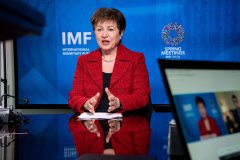Russia to expel 10 US diplomats in response to Biden actions
Russia's top diplomat says Moscow will expel 10 U.S. diplomats in response to U.S. sanctions
April 16, 2021, 6:21 PM
7 min read
Share to FacebookShare to TwitterEmail this article1:51
The Biden administration on Thursday announced a sweeping series of sanctions against Russia over election interference, cyber hacking and other “harmful foreign activities.”
The Associated PressMOSCOW -- Russia on Friday responded to a barrage of new U.S. sanctions by saying it would expel 10 U.S. diplomats and take other retaliatory moves in a tense showdown with Washington.
Foreign Minister Sergey Lavrov also said Moscow will add eight U.S. officials to its sanctions list and move to shut down those U.S. nongovernment organizations that remain in Russia to end what he described as their meddling in Russia’s politics.
The top Russian diplomat said the Kremlin suggested that U.S. Ambassador John Sullivan follow the example of his Russian counterpart and head home for consultations. Russia will also move to deny the U.S. Embassy the possibility to hire personnel from Russia and third countries as support staff, limit visits by U.S. diplomats serving short-term stints at the embassy, and tighten requirements for U.S. diplomats' travel in the country.
On Thursday, the Biden administration announced sanctions on Russia for interfering in the 2020 U.S. presidential election and involvement in the SolarWind hack of federal agencies — activities Moscow has denied. The U.S. ordered 10 Russian diplomats expelled, targeted dozens of companies and people, and imposed new curbs on Russia’s ability to borrow money.
While the U.S. wields the power to cripple the Russian economy, Moscow lacks levers to respond in kind, although it potentially could hurt American interests in many other ways around the globe.
Lavrov called Washington’s move “absolutely unfriendly and unprovoked," and he said that while Russia could take “painful measures” against American business interests in Russia, it wouldn’t immediately move to do that and “save them for future use.”
He warned that if Washington moves to further raise the pressure, Russia might ask the U.S. to reduce the number of its embassy and consular staff from about 450 to 300. He said Russia and the U.S. each have about 450 diplomats, but for Russia the number includes some 150 U.N. personnel that he argued shouldn't be part of the equation.
Russia's economic potential and its global reach are limited compared with the Soviet Union that competed with the U.S for international influence during the Cold War. Still, Russia's nuclear arsenal and its leverage in many parts of the world make it a power that Washington needs to reckon with.
Aware of that, President Joe Biden called for de-escalating tensions and held the door open for cooperation with Russia in certain areas. Biden said he told Putin in Tuesday's call that he chose not to impose tougher sanctions for now and proposed to meet in a third country in the summer.
Lavrov said Russia had a “positive attitude” to the summit offer and was analyzing it, but a statement issued by the Foreign Ministry shortly after noted that it ”was being studied in the context of the evolving situation."
The ministry charged that Russia would like to avoid further escalation and engage in a “calm and professional dialogue,” but has other means to retaliate if Washington tries to crank up the pressure.
While the new U.S. sanctions further limited Russia’s ability to borrow money by banning U.S. financial institutions from buying Russian government bonds directly from state institutions, they didn't target the secondary market.
“It’s very important that there’re no sanctions on secondary debt because that means that non-U.S. persons can buy the debt and sell it to the U.S. persons,” said Tom Adshead, director of research at Macro-Advisory Ltd, an analytics and advisory company.
Timothy Frye, a Columbia University political scientist, noted that the Biden administration chose not to increase sanctions against the prospective Nord Stream 2 natural gas pipeline to Germany or go after large Russian state-controlled companies.
"That’s part of the broader strategy of using sanctions but also reaching out to the Kremlin to propose talks on strategic stability and eventually on a summit,” he said.
Tougher restrictions would also hurt Western businesses, inflict significant economic pain on the Russian population and allow Putin to rally anti-U.S. sentiments to shore up his rule.









